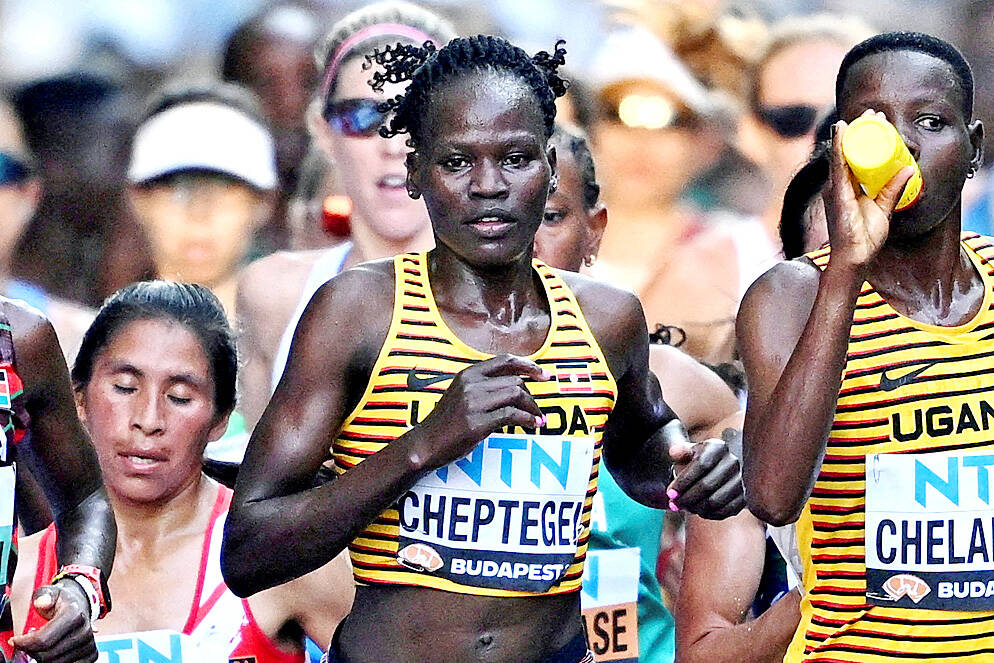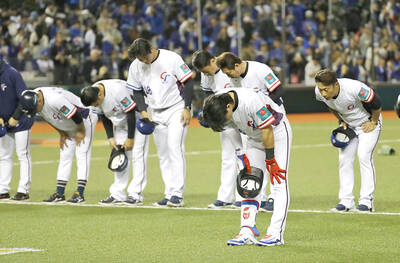The former partner of Ugandan athlete Rebecca Cheptegei, who is accused of killing her by dousing her in gasoline and setting her on fire, has died from burns sustained during the attack, the Kenyan hospital where he was being treated said yesterday.
Cheptegei, 33, who competed in the marathon at the Paris Olympics, sustained burns to more than 75 percent of her body in the Sept. 1 attack and died four days later.
Her former boyfriend, Dickson Ndiema Marangach, died at 7:50pm on Monday, said Daniel Lang’at, a spokesman at Moi Teaching and Referral Hospital in Eldoret in western Kenya, where Cheptegei was also treated and died.

Photo: Reuters
“He died from his injuries, the burns he sustained,” Lang’at said.
Local media reported that he had sustained 30 percent burns when he assaulted Cheptegei as she was returning home from church with her children.
Cheptegei, who finished 44th in Paris, is the third elite sportswoman to be killed in Kenya since October 2021. Her death has put the spotlight on domestic violence in the East African country, particularly within its running community.
Rights groups say female athletes in Kenya, where many international runners train in the high-altitude highlands, are at a high risk of exploitation and violence at the hands of men drawn to their prize money, which far exceeds local incomes.
“Justice really would have been for him to sit in jail and think about what he had done. This is not positive news whatsoever,” said Viola Cheptoo, cofounder of Tirop’s Angels, a support group for survivors of domestic violence in Kenya’s athletic community.
“The shock of Rebecca’s death is still fresh,” Cheptoo said.
She cofounded Tirop’s Angels in memory of Agnes Tirop, a rising star in Kenya’s highly competitive athletics scene, who was found dead in her home in the town of Iten in October 2021, with multiple stab wounds to the neck.
Ibrahim Rotich, Tirop’s husband, was charged with her murder and has pleaded not guilty. The case is ongoing.

Taiwan kept its hopes of advancing to the 2026 World Baseball Classic (WBC) alive with a 9-1 victory over South Africa in a qualifier at the Taipei Dome last night, backed by solid pitching. Bouncing back from Friday’s struggles on the mound, when Taiwanese pitchers surrendered 15 runs to Spain, Team Taiwan kept the visiting team in check, allowing just one run in the bottom of the fourth inning. The win was crucial for Taiwan, as a loss would have eliminated the team from contention for the next WBC. Starting pitcher Sha Tzu-chen (沙子宸) struck out one and allowed no hits, except for

Taiwan kept their hopes of advancing to next year’s World Baseball Classic (WBC) alive with a 9-1 victory over South Africa in a qualifier at the Taipei Dome on Saturday, backed by solid pitching. Taiwan last night played against Nicaragua. As of press time, Nicaragua was leading 6-0. Bouncing back from Friday’s struggles on the mound, when Taiwanese pitchers surrendered 15 runs to Spain, Team Taiwan on Saturday kept the visiting team in check, allowing just one run in the bottom of the fourth inning. Starting pitcher Sha Tzu-chen struck out one and allowed no hits, except for a hit-by-pitch over

The Chinese Professional Baseball League (CPBL) is considering reducing its pitch clock by two seconds to help players better adjust to the rules applied at the World Baseball Classic (WBC). The proposal aims to shorten the pitch timer from 25 seconds to 23 seconds with the bases empty, and from 20 seconds to 18 seconds with runners on base. Currently, the WBC mandates that pitchers deliver a pitch every 18 seconds with the bases empty and 15 seconds with runners on base. The issue was raised during a pre-season CPBL managers’ meeting on Tuesday by Rakuten Monkeys bench and batting

Team Taiwan are set to face Spain in a win-or-go-home match tonight for the final berth at the 2026 World Baseball Classic (WBC), despite losing to Nicaragua 6-0 in the WBC qualifier at the Taipei Dome on Sunday. The home team’s loss on Sunday means Nicaragua finish first in the qualifier round in Taipei with a perfect 3-0 record and advances to next year’s finals. After crushing South Africa 9-1 earlier on Sunday, Spain took second place in the four-team qualifier with a 2-1 record. With a 1-2 record, Taiwan finished third while South Africa placed at the bottom with